Anonymous1 (talk | contribs) No edit summary |
JacobWalsh (talk | contribs) |
||
| (42 intermediate revisions by 11 users not shown) | |||
| Line 1: | Line 1: | ||
=Disadvantages Kerosene lamps= | |||
*Kerosene lamps pollute the air, which can lead to health problems | *Kerosene lamps pollute the air, which can lead to health problems | ||
* | *Kerosene lamps lose a lot of energy while producing heat | ||
=Disadvantages Edison light bulb= | |||
* | *Glow bulb lamps lose a lot of energy while producing heat and attracts insects | ||
=Disadvantages LED lighting= | |||
* | *LED lighting is very expensive as an alternative to fluorescent tubing though it does offer an increased lamplife of 50,000 run hours (approx 10 years) over a fluorescent tube which is typically 9000 hours. Modern LED alternatives to fluorescent tubing also offer a power saving of about 40-60% though this saving is normally not great enough to pay back the difference in cost between the LED alternative and fluorescent tube over the life of the fitting. | ||
=Disadvantages Energy saving [[fluorescent bulbs]] lamps= | |||
* | *Energy saving [[fluorescent bulbs]] lamps have a short life and cannot handle vibrations and are expensive | ||
* Many types contains mercury and other dangerous metals | |||
=Advantages Standard fluorescent tubes= | |||
* | *Standard fluorescent tubes have a long life and are energy efficient and are cheap. | ||
=Disadvantages ballast with thyristor= | |||
* | *Fluorescent bulbs and tubes have a thyristor in the electronic ballast | ||
*This thyristor spoils a lot of energy producing heat. | |||
* | *The base or outlet end of the fluorescent lamp has two filament coils | ||
* | *These coils spoil a lot of energy producing heat wen used with a thyristor ballast | ||
=Advantages CCFL and EEFL inverter= | |||
[[Wikipedia:CCFL inverter]] | |||
*have no thyristor that heat up, but has two transistors. | |||
*CCFL inverter can work on minimum 6 volt power | |||
=Advantages CCFL lamp= | |||
*Smaller, thinner, and more light weight than a known fluorescent lamp. | |||
*Have no filament coils that heat up, but Cold cathodes. | |||
*Have a longer life | |||
*Can better handle vibrations. | |||
*This makes the CCFL lamp very use full to use in [[all]] areas | |||
=Advantages EEFL lamp= | |||
*Smaller, thinner and more light weight than a known fluorescent lamp. | |||
*Have no filament coils that heat up, but External Electrodes. | |||
External Electrodes can easely take lose from the Fluorescent Lamp | |||
*Have a longer life than CCFL | |||
*Can better handle vibrations. | |||
*More EEFL lamps can connect parallel on one EEFL inverter | |||
* | *This makes the EEFL lamp very use full to use in poor areas | ||
=Advantages CCFL inverter+FL lamp = | |||
* | *you can use the CCFL inverter to light up a old fluorescent lamp. | ||
*The inverter use the filament coils like Cold cathodes. | |||
*Does not Matter if these coils are broken. | |||
*the end of the fluorescent lamp does not heat up. | |||
=Disadvantages CCFL and EEFL= | |||
The mercury in the tubes [[fluorescent-bulbs]] | |||
==Importance of Lamp Cap with the following benefits:== | |||
Like the [[3rd world CCFL lamp (2007 model)]] the inverter near the CCFL-tubes-lamps | |||
-Energy efficient | |||
-Protected against falling from heights | |||
-Protected against vibrations | |||
-Protected against impressions | |||
-Water, air and insect tight | |||
-Acceptable design | |||
-Easy to adjust in any direction | |||
-Inexpensive | |||
-Can work on low plus and min (DC) voltage | |||
-can be made partly of recycled materials | |||
[[Image:ccfl in old scanner.GIF|thumb|left|CCFL in old document scanner]] | |||
== How to== | |||
You can use a CCFL and electronic ballast out of an old SCSI document scanner. Just so you know a ballast is the same as an Inverter. Also not all scanners have CCFL technology the new ones have LED technology and very old black and white faxes have LED technology. You may be lucky enough to find in some scanners a separated CCFL inverter circuit board. | |||
WARNING the CCFL inverter has a dangerous high voltage output | |||
[[Image:old scanner with ccfl and ballast.jpg|thumb|right|old scanner with CCFL and inverter]] | |||
Instructions: | |||
*Make a drawing of the electronic schema | |||
*Some times you can find a circuit board with the CCFL inverter electronics and some scanning electronics. | |||
*You have to separate the scanning electronic parts | |||
*Cut of the CCFL ballast unrelated electronic | |||
*Now it have the right shape to use this inverter to light up the CCFL lamp. | |||
*It is possible to use a CCFL inverter in combination with a normal fluorescent tube lamp | |||
[[Image:cut off ballast back.jpg|thumb|left|Ballast back print part, cut off ballast back]] | |||
[[Image:cut off ballast front.jpg |thumb|center|Ballast front print part, cut off ballast front]] | |||
[[Image:take out the ccfl and ballast.JPG|thumb|left|CCFL and ballast|300px]] | |||
[[Image:G5 T5 tube lamp and CCFL ballast.JPG|thumb|right|normal tube lamp and CCFL ballast|300px]] | |||
[[Image:separated balast print.jpg|thumb|center|separated ballast print]] | |||
== CCFL lamp and ballast out of a fax machine == | == CCFL lamp and ballast out of a fax machine == | ||
[[Image:ccfl in old fax.GIF|thumb|right|CCFL in old FAX]] | |||
It is possible to use a CCFL and electronic ballast out | It is possible to use a CCFL and electronic ballast out off an old fax machine, however some fax machines have a colored CCFL tube | ||
* In some colored CCFL tube faxes it is possible to take the colored film off | |||
* | *Some colored CCFL tube faxes have colored glass, then the tube is useless for the lamp cap | ||
*Some colored CCFL | |||
*The CCFL tube is in the paper scanning part of the fax | *The CCFL tube is in the paper scanning part of the fax | ||
*CCFL ballast is connected with the CCFL tube | |||
*Not all fax machines have CCFL technology | |||
*New fax machines and the very old fax machines have LED technology | |||
== LINKS == | |||
[[Inverter for fluorescent lamp]] | |||
[[3rd world CCFL lamp (2007 model)]] | |||
== Interwiki links == | |||
* [[Wikipedia:Cold cathode]] | |||
[[ | |||
[[Category:3rd world arm lamp]] | |||
[[Category:Photovoltaics]] | [[Category:Photovoltaics]] | ||
[[Category:How tos]] | [[Category:How tos]] | ||
| Line 170: | Line 170: | ||
[[Category:Demotech]] | [[Category:Demotech]] | ||
[[Category:Electronics]] | [[Category:Electronics]] | ||
Revision as of 01:48, 4 December 2017
Disadvantages Kerosene lamps
- Kerosene lamps pollute the air, which can lead to health problems
- Kerosene lamps lose a lot of energy while producing heat
Disadvantages Edison light bulb
- Glow bulb lamps lose a lot of energy while producing heat and attracts insects
Disadvantages LED lighting
- LED lighting is very expensive as an alternative to fluorescent tubing though it does offer an increased lamplife of 50,000 run hours (approx 10 years) over a fluorescent tube which is typically 9000 hours. Modern LED alternatives to fluorescent tubing also offer a power saving of about 40-60% though this saving is normally not great enough to pay back the difference in cost between the LED alternative and fluorescent tube over the life of the fitting.
Disadvantages Energy saving fluorescent bulbs lamps
- Energy saving fluorescent bulbs lamps have a short life and cannot handle vibrations and are expensive
- Many types contains mercury and other dangerous metals
Advantages Standard fluorescent tubes
- Standard fluorescent tubes have a long life and are energy efficient and are cheap.
Disadvantages ballast with thyristor
- Fluorescent bulbs and tubes have a thyristor in the electronic ballast
- This thyristor spoils a lot of energy producing heat.
- The base or outlet end of the fluorescent lamp has two filament coils
- These coils spoil a lot of energy producing heat wen used with a thyristor ballast
Advantages CCFL and EEFL inverter
- have no thyristor that heat up, but has two transistors.
- CCFL inverter can work on minimum 6 volt power
Advantages CCFL lamp
- Smaller, thinner, and more light weight than a known fluorescent lamp.
- Have no filament coils that heat up, but Cold cathodes.
- Have a longer life
- Can better handle vibrations.
- This makes the CCFL lamp very use full to use in all areas
Advantages EEFL lamp
- Smaller, thinner and more light weight than a known fluorescent lamp.
- Have no filament coils that heat up, but External Electrodes.
External Electrodes can easely take lose from the Fluorescent Lamp
- Have a longer life than CCFL
- Can better handle vibrations.
- More EEFL lamps can connect parallel on one EEFL inverter
- This makes the EEFL lamp very use full to use in poor areas
Advantages CCFL inverter+FL lamp
- you can use the CCFL inverter to light up a old fluorescent lamp.
- The inverter use the filament coils like Cold cathodes.
- Does not Matter if these coils are broken.
- the end of the fluorescent lamp does not heat up.
Disadvantages CCFL and EEFL
The mercury in the tubes fluorescent-bulbs
Importance of Lamp Cap with the following benefits:
Like the 3rd world CCFL lamp (2007 model) the inverter near the CCFL-tubes-lamps
-Energy efficient
-Protected against falling from heights
-Protected against vibrations
-Protected against impressions
-Water, air and insect tight
-Acceptable design
-Easy to adjust in any direction
-Inexpensive
-Can work on low plus and min (DC) voltage
-can be made partly of recycled materials
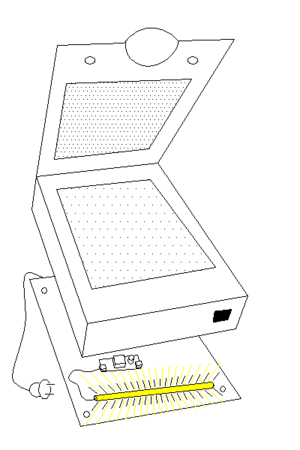
How to
You can use a CCFL and electronic ballast out of an old SCSI document scanner. Just so you know a ballast is the same as an Inverter. Also not all scanners have CCFL technology the new ones have LED technology and very old black and white faxes have LED technology. You may be lucky enough to find in some scanners a separated CCFL inverter circuit board.
WARNING the CCFL inverter has a dangerous high voltage output
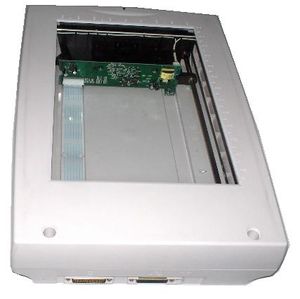
Instructions:
- Make a drawing of the electronic schema
- Some times you can find a circuit board with the CCFL inverter electronics and some scanning electronics.
- You have to separate the scanning electronic parts
- Cut of the CCFL ballast unrelated electronic
- Now it have the right shape to use this inverter to light up the CCFL lamp.
- It is possible to use a CCFL inverter in combination with a normal fluorescent tube lamp
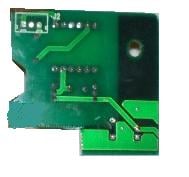
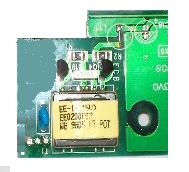
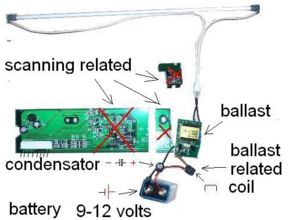
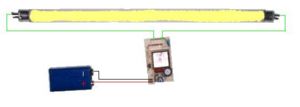
CCFL lamp and ballast out of a fax machine
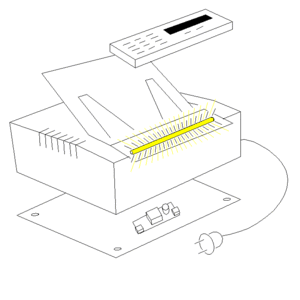
It is possible to use a CCFL and electronic ballast out off an old fax machine, however some fax machines have a colored CCFL tube
- In some colored CCFL tube faxes it is possible to take the colored film off
- Some colored CCFL tube faxes have colored glass, then the tube is useless for the lamp cap
- The CCFL tube is in the paper scanning part of the fax
- CCFL ballast is connected with the CCFL tube
- Not all fax machines have CCFL technology
- New fax machines and the very old fax machines have LED technology
LINKS
Inverter for fluorescent lamp 3rd world CCFL lamp (2007 model)